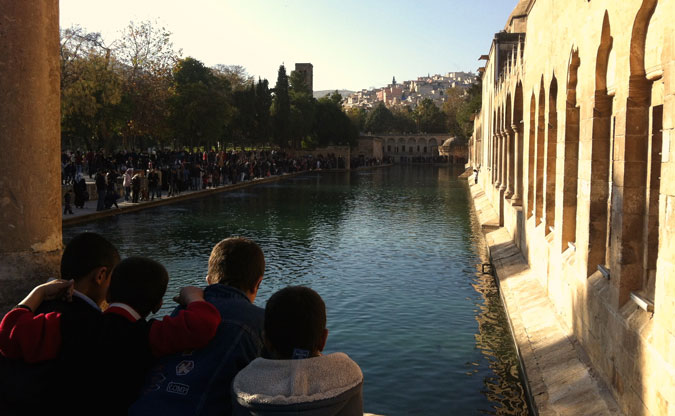Urfa – a photo

I cannot come, he texted quite ill at ease. Niet from London, from London they say nope. Although Urfa is a six-hour flight from London, it’s in Turkey. But it is in London, and other Western capital cities, that NGOs dealing with Syria have their HQs: and it is in London, in Milan, in Paris, that the security assessment is carried out, especially for what concerns kidnappings. And so the quiet, drab Litai Café has somehow ended up in the blacklist. A. is German, and has been here for five days to decide what refugees need the most. But he decided it penned into his office. Too dangerous to walk around Urfa.
Like many others, he is based in Istanbul. He has never been in Syria.
Nor he has never been in a refugee camp.
“I could stay in Istanbul, and with the money I spent, feed for a month the two child beggars from Aleppo who live just in front of my house. I would have been more useful,” he bursted out. And he is not an exception. With the ISIS butchers behind the corner, security measures here are stricter than ever: as a consequence, yet, the best aid officers all want to leave. Because it’s frustrating enough to work on Syria, rather than in Syria – but in this way makes no sense. There are only the youngest. The beginners. The good-willings. Those who are 26, 27 years old, newly graduated, their mind stuffed with theories on how to save the world, and find nothing weird in never meeting those they are supposed to help – or more exactly: those they are supposed to help helping themselves, because colonialism is over, of course, and now the rallying cry is empowering: not to give fish, but to teach fishing. Except that then they all live on their own, all together all the time, and the only natives they are in touch with are taxi drivers.
Their main source of information is Facebook.
They tell you: I’m on the field, as if they were in the jungle. Outside Europe, for them everything is field. It’s wild. Even if they are calling from Urfa’s Hilton Hotel.
And in Urfa is particularly embarrassing, because Urfa is wonderful. Destination of thousands of pilgrims: it’s cafés and hotels everywhere. Since it’s here that Abraham, the patriarch of Judaism, Christianity and Islam, was born. And it’s here, the legend goes, that he was thrown down the hill, on a pyre, for criticizing pagan rituals: but the fire turned into water, and the embers into carps – those that still swim in the canals across the park. Urfa is wonderful, it’s a postcard of Turkey. Entrench yourself in a office, here, not only makes no sense: but it steps up risks, rather than reducing them. We have this military idea of security. Weapons, intelligence, armoured vehicles. Body guards, encripted emails. Not to go out, not to talk. And in case, talking without saying anything. Vaguely. Never unveil yourself. Keep invisible. As if it were possible not to be noticed, in such a society, where they all know each other, they all are cousins – and actually, we are even dressed all the same: North Face from head to toe. We have this idea of security as walls and barriers. But security comes from the opposite choice: integration. To be part of the society you are a guest of, with sensitivity and curiosity. With respect. Strangers, but not strange.
“Think if it happened to you. Four years of war, Italy in ruins. Your life upside-down. And all these Arab kids, all of a sudden, that speak only Arabic, and live on their own, and have barely read a book on your country: and yet they manage millions of dollars for projects nobody has ever ask your opinion about,” I was told by one of the Syrians I was waiting A. with.
The fear of jihadists is descending into a phobia. And like every phobia, it prevents a rational, balanced analysis. It prevents the understanding of the context. Because we are not talking of Raqqa, of Mosul. We are talking of Urfa: a Kurdish city, PKK leader Abdullah Ocalan was born nearby. The grey, dangerous areas, the no man’s lands through which weapons and fighters get smuggled into Syria are Antep and Hatay, further westwards. Here there are the Kurds: and consequently, there is Turkey. There is the state. There is a minority that seeks rights and self-government, and a state that blame this struggle as terrorism. Police, army. Iron fist.
“But D. is coming?”, I asked. D. works in another NGO. “We didn’t call him,” they replied. “You know that NGOs cannot stand each other.” Since competition, among NGOs, is fierce. And I was reminded of Jamal Jouma. In Ramallah, one of my best friends. But if you fight over every project, he says, if you don’t exchange information, you don’t talk each other, help each other, actually, if you try your best to thwart each other, but what sort of example you give to Israelis and Palestinians? What’s your credibility when you tell us to trust each other? To live together?